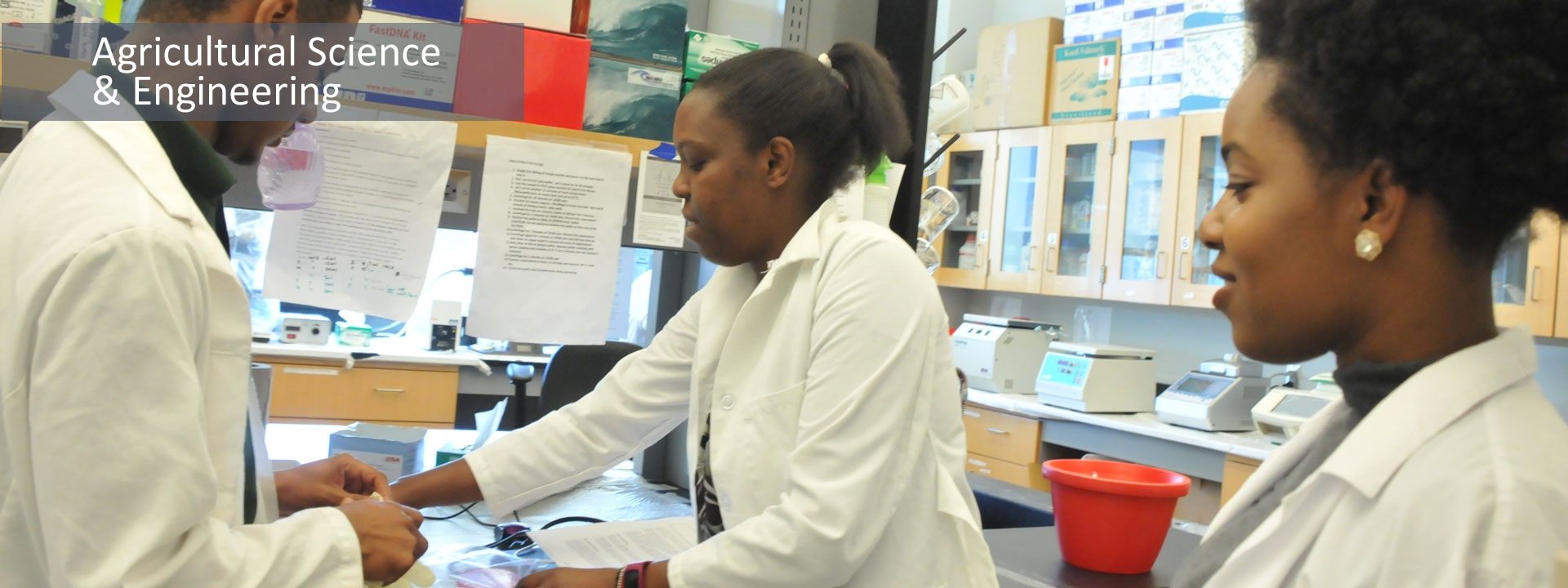- Home >
- Agricultural Programs >
- Degree Programs
- > M.S. in ENVIRONMENTAL SCIENCES
ENVIRONMENTAL SCIENCES

The Master of Science in Environmental Science degree is offered with three concentrations: Natural Resources, Plant Sciences, and Geospatial Sciences. The degree is offered with two options, thesis or non-thesis. The thesis option requires a minimum of twenty-six (26) credit hours of course work and a thesis of four (4) credit hours. The candidate for the degree must complete eighteen (18) credit hours of core courses: AGSC 5060, AGSC 5110, AGSC 5120, AGSC 5260, AGSC 5500 OR AGSC 5510, AGSC 5610, AGSC 5620, and twelve (12) credit hours maximum of guided electives from the selected concentration. The non-thesis option requires a minimum of thirty-five (35) credit hours of course work. The candidate for the degree must complete seventeen (17) credit hours of core courses: AGSC 5060, AGSC 5110, AGSC 5350, AGSC 5260, AGSC 5500 OR AGSC 5510, AGSC 5610, AGSC 5620 and eighteen (18) credit hours maximum of guided electives from the selected concentration. These courses must be approved by the student’s advisor and the Department Head.
Applicants must have the equivalent of a bachelor’s degree with a major in one of the Agricultural Sciences or Environmental Sciences or Forestry or Geography or related areas, a minimum quality grade point average of 2.50 on a 4.00 scale, and a minimum score of 290 on the GRE (verbal and quantitative) or 370 on the MAT for unconditional admission. Higher GPA from the accredited colleges and universities or GRE scores may be used to compensate for some minor deficiencies in admission requirements.
The degree candidate must file a program of study after completing at least nine (9) semester hours of graduate credit, but before completing fifteen (15) hours of graduate credit. The program lists the courses which will be used to satisfy degree requirements, as well as detailing how other requirements will be met. The student may later change the program of study with the written approval of the Department and the Graduate School.
When the candidate files the program of study, he or she may also apply for admission to candidacy. The candidate must have a grade point average of 3.00 or above on a 4.00 scale and successfully defended the thesis proposal (thesis option) or successfully passed the written and oral comprehensive examinations (non-thesis option) to be eligible for admission to candidacy.
Core Courses: Thesis option 18 credit hrs. or Non-thesis option 17 credit hrs.
AGSC 5060 – Statistics for Research 3 credits
AGSC 5110 – Research Methods 3 credits
AGSC 5120 – Thesis Writing 4 credits
OR
AGSC 5350 – Independent Study of Contemporary Issues & Problems (non-thesis option) 3 credits
AGSC 5500 – Environmental Issues and Sustainability
OR
AGSC 5510 – Ecosystem Science and Management 3 credits
AGSC 5260 – Environmental Analysis 3 credits
AGSC 5610, 5620 – Graduate Seminar in Agricultural Sciences I, II 1, 1 credits
Concentration Electives: 12 credit hrs minimum with Thesis or 18 credit hrs minimum for Non-thesis option
Natural Resources Concentration
BIOL 5190 – Ecology 3 credits
AGSC 5320 – Wetlands Ecology & Management 3 credits
AGSC 5530 – Forest Ecology and Management 3 credits
AGSC 5570 – Climate Change 3 credits
AGSC 5900 – Applied Entomology 3 credits
AGSC 6510 – Geospatial Information Systems 3 credits
AGSC 6525 – Remote Sensing Image Analysis 3 credits
AGSC 5350 – Independent Study of Contemporary Issues & Problems (thesis option) 3 credits
OR
Guided elective (non-thesis option) 3 credits
Plant Science Concentration
AGSC 5015 – Principles of Organic Agriculture 3 credits
AGSC 5180 – Soil Classification 3 credits
AGSC 5190 – Plant Breeding 3 credits
AGSC 5220 – Plant Growth Substances 3 credits
AGSC 5230 – Advanced Propagation of Horticultural Plants 3 credits
AGSC 5900 – Applied Entomology 3 credits
AGSC 6510 – Geographic Information Systems 3 credits
AGSC 5350 – Independent Study of Contemporary Issues & Problems (thesis option) 3 credits
OR
Guided elective (non-thesis option) 3 credits
Geospatial Sciences Concentration
AGSC 6510 – Geospatial Information Systems 3 credits
AGSC 6520 – Advanced Spatial Analysis 3 credits
AGSC 6525 – Remote Sensing Image Analysis 3 credits
AGSC 6530 – Advanced Geospatial Metadata 3
AGSC 6540 – Advanced Spatial Database Design and Management 3 credits
AGSC 6550 – Advanced Geospatial Information Systems Application and Design 3 credits
AGSC 6560 – Global Positioning Systems 3 credits
Guided elective 3 credits
PDF versions: Natural Resources Concentration, Plant Science Concentration, Geospatial Sciences Concentration
Each student must pass Research Methods (AGSC 5110) and Statistics for Research (AGSC 5060), must have a thesis advisory committee appointed, and must be advanced to candidacy before enrolling in Thesis Writing (AGSC 5120).
The candidate must submit a thesis on a topic approved by the major advisor. Upon completion of the thesis, the candidate must satisfactorily a pass proposal defense conducted by the student’s thesis advisory committee. Students choosing thesis option will require thirty (30) hours of course work which will include four (4) credit hours of thesis research (AGSC5120).
This option is for students who would like to focus on training in specialized areas to meet the needs of employers in agricultural and environmental sciences related industry, private sector, and state and federal government agencies. This program is not recommended for students who have any aspirations toward pursuing a Ph.D. degree.
Students choosing the non-thesis option will be required to take a minimum of thirty-five (35) credit hours of course work which will include AGSC 5350 – Independent Study of Contemporary Issues and Problems. The graduate student with guidance from his or her major advisor will identify contemporary issues and problems in agricultural and environmental sciences, conduct comprehensive literature review, write a report in a format of a review paper and make an oral presentation to his or her advisory committee.
Upon completion of core courses including AGSC 5350, students choosing the non-thesis option must take a comprehensive written and oral examination administered by the student’s advisory committee that includes faculty members representing appropriate subject matter areas. The student’s major advisor will serve as the committee chairperson and will facilitate the administration of both oral and written examinations.
If a student fails the comprehensive examination, one retake will be allowed. Should the student again fail, a third and final examination may be taken upon completion of additional course work (minimum of 6 hours) to be selected by the student’s advisory committee.
For mor information, contact the Graduate coordinator: Dr. Bharat Pokharel, (615) 963-6054.


